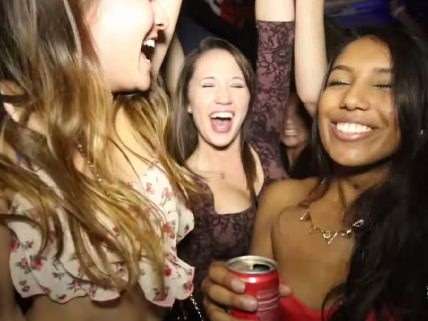To Reduce Campus Rape, Legalize Pot and Alcohol
Reefer madness in reverse


Would full legalization of marijuana reduce rape on college campuses? There is an argument to be made that kids who substitute pot for alcohol are less likely to behave violently; increasing access to weed gives students the option to put down the bottle.
Let's call this argument "reverse reefer madness." New York Magazine's Annie Lowrey makes a surprisingly strong case for it in a recent article:
There's a fun thing that economists and public-policy types think might cut back on alcohol-fueled violence, too: the decriminalization or legalization of marijuana. The studies are a little thinner and shakier here. Nevertheless, there is some evidence that young people tend to substitute pot for alcohol. They either burn one down or chug one down; more pot means less beer. And there's also evidence that increasing the price of beer nudges young people to switch to pot — with some significant effects, including lower rates of violent crime. "Alcohol is clearly the drug with the most evidence to support a direct intoxication-violence relationship," according to one paper in the journal Addictive Behaviors. "Cannabis reduces likelihood of violence during intoxication."
She may be on to something here. As readers of Reason know, there is nothing particularly dangerous or mind-warping about moderate marijuana use; people who smoke pot don't suddenly become violent criminals. And while the overwhelming majority of people who drink do so safely, it's true that alcohol—not marijuana—is the drug most-commonly associated with actual violence. This is especially true of campus rape, the occurrences of which almost always involve severe alcohol abuse.
There are already many good reasons to support the legalization of marijuana—a de-escalation of the financially costly and socially destructive War on Drugs chief among them—but it never hurts to add another. If legal weed has a diminishing effect on the campus rape crisis as well, great.
Lowrey deserves credit for raising this proposition. She also deserves praise for writing honestly about campus rape and the role that binge-drinking plays. Alcohol, she recognizes, is the rapist's weapon of choice, "increases aggression," and "makes victims more vulnerable to abuse."
Keeping all that in mind, Lowrey suggests an all-out war on alcohol as another method to reduce rape. Her vision is essentially a reconstituted Prohibition:
Impose higher taxes on alcoholic beverages. Add extra levies on the purchase of large amounts of alcohol, like kegs or handles. Slap fees on liquor stores that are located near college campuses. Ban the sale of alcohol near schools. Colleges and universities themselves could also try to influence the price of drinking — charging sororities, fraternities, and social organizations for throwing parties, say, or barring them from offering alcohol for free. A college rager with a cash bar asking $5 a Solo cup is no college rager at all, hard though that rule might be to enforce.
And that's where Lowrey and I part company. What she fails to note is that most college students already live under a Prohibitionist regime. Drinking is illegal for the under-21 crowd. Getting caught drinking means paying a fine at a minimum—and possibly facing much worse, even life-altering, consequences. Underage drinkers face massive potential costs, but that doesn't seem to deter college binge-drinking. Lowrey would prefer to hit them up-front with the taxes rather than police them afterward, and maybe that's a more viable approach. Still, making alcohol harder to obtain means driving the culture underground. Fraternities already fill the niche of providing booze to those who can't legally purchase it—has this proved to be a suitable arrangement in the eyes of anti-rape activists? What if they also fill the niche of providing booze to those who can neither afford nor legally purchase it? And I simply don't think it's possible (even if desirable), using the methods Lowrey proposes, to restrict the alcohol supply so completely that everybody defects to pot.
I don't want to create stronger black markets for illicit substances, where the most dangerous kinds of abuse emerge and go untreated. Instead of driving campus drinking culture even further underground—while adding an aura of extravagance to it—let's permit local decision-makers to experiment with a different approach. I expect they would find that lawlessness, excess, and violence are worsened by a Prohibitionist approach, whether the substance is alcohol, marijuana, or anything else.
More from Reason on the case for repealing the National Minimum Drinking Age Act here.


Show Comments (170)